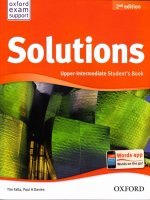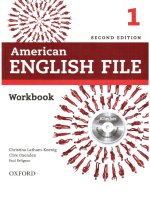Practical audio visual chinese students workbook 2nd edition 1
Bạn đang xem bản rút gọn của tài liệu. Xem và tải ngay bản đầy đủ của tài liệu tại đây (5.15 MB, 202 trang )
实用
视听华语
主编者:国立台湾师范大学
编辑委员:王淑美·卢翠英·陈夜宁
策划者:教育部
实用
视听华语
主编者:国立台湾师范大学
编辑委员:王淑美·卢翠英·陈夜宁
策划者:教育部
《实用视听华语》第 3 册共十四课,内容著重在校园活动和日常
生活话题。生字共 600 个,生词 1195 条,语法句型 137 则。每课加
附不同形式之手写短文。
《实用视听华语》第 4 册共十四课,延续介绍中华文化,包括社
会、历史、地理、人情世故。生字共 625 个,生词 1250 条,语法
配合情境介绍句型 119 则。每课加附手写短文。
《实用视听华语》第 5 册共二十课,课文介绍中华文化之特质及
风俗习惯;以短剧、叙述文及议论文等体裁为主,内容则以民俗文
化、傅统戏剧、文字、医药、科技、环保、消费、休闲等配合时代
潮流,以提高学生对目前各类话题讨论的能力。本册生词 667 条,
连结结构之句型 91 则。每课除课文外,另附有阅读与探讨、佳文
欣赏及成语故事。
本书所有的生字与生词及第 1、2 册课文,拼音系采用 1.国语注
音;2.通用拼音;3.汉语拼音并列,以收广为使用之效。
每册教材所包括的内容大致如下:1.课文、对话;2.生字、生词
及用法;3.语法要点及句型练习;4.课室活动;5.短文;6.注释。
本书第 1、2 册由王淑美、卢翠英两位老师负责改编工作;第
3、4 册由范慧贞、刘咪咪两位老师负责改编工作;第 5 册由张仲
敏、陈莹涟两位老师负责改编工作;英文由任友梅小姐工作群翻
译。并由林姿君小姐、陈雅雪老师、林容年老师及三位助理完成打
字及整理全稿工作。插图则由张欣怡小姐补充设定完成。
本书在完成修改稿后,曾邀请华语文专家学者进行审查,经过修
订后定稿。审查委员如下:陈纯音教授、曾金金教授、陈俊光教
授、陈浩然教授。
本书改版作业历时半年有余,在台湾师大国语中心教材组陈立芬
老师等工作人员之全力配合下得以完成,感谢所有尽心戮力参与编
辑得作者及审核的委员,使这部修订版《实用视听华语》得以出
版。各位教学者使用时,请不吝指教并匡正。
主编 叶德明
2007 年 3 月
目录
第一课
您贵姓?
第二课
早,您好!
第三课
我喜欢看电影。
第四课
这支笔多少钱?
第五课
我家有五个人。
第六课
我想买一个新照相机。
第七课
你的法文念得真好听。
第八课
这是我们新买的电视机。
第九课
你们学校在哪里?
第十课
我到日本去了。
第十一课
你几点钟下课?
第十二课
我到外国去了八个多月。
第一课 您贵姓?
1. DIALOGUE
I.
李先生:先生,您贵姓?
王先生:我姓王,您贵姓?
李先生:我姓李,叫大卫( Dàwèi)*。
王先生:李先生,您好。
李先生:您好。您是美国人吗?
王先生:不是,我是英国人。
*
大卫(Dàwèi): David
II.
李爱美:你好。
王珍妮:你好。
李爱美:我叫李爱美*,你叫什么名字?
王珍妮:我叫珍妮*。
李爱美:珍妮,你是哪国人?
王珍妮:我是美国人,你呢?
李爱美:我是台湾人。
*
*
爱美(Ài měi):Amy
珍妮(Zhēnnī): Jenny
拼音
I.
Lǐ xiānshēng: Xiānshēng, nín gxìng?
Wáng xiānshēng: Wǒ xìng wáng, nín guìxìng?
Lǐ xiānshēng: Wǒ xìng lǐ, jiào dà wèi.
Wáng xiānshēng: Lǐ xiānshēng, nín hǎo.
Lǐ xiānshēng: Nín hǎo. Nín shì měig rén ma?
Wáng xiānshēng: Bùshì, wǒ shì yīngg rén.
II.
Lǐ'àiměi: Nǐ hǎo.
Wáng zhēnnī: Nǐ hǎo.
Lǐ'àiměi: Wǒ jiào lǐ'àiměi, nǐ jiào shénme míngzì?
Wáng zhēnnī: Wǒ jiào zhēnnī.
Lǐ'àiměi: Zhēnnī, nǐ shì nǎ grén?
Hgy Wáng zhēnnī: Wǒ shì měig rén, nǐ ne?
Lǐ'àiměi: Wǒ shì táiwān rén.
2. VOCABULARY
1. 您(nín) PN: you (a formal and respective form)
您好!
Nín hǎo
Hello!
2. 贵姓 ( gùixìng) IE: May I know your last name?
您贵姓?
Nín gùixìng?
May I know your last name?
姓( xìng) V/N: surname, family name, last name
他姓王吗?
Tā xìng wáng ma?
Is his last name Wang?
3. 李( Lǐ ) N: a common Chinese surname
4. 先生( xiānshēng) N: Mr, Sir, gentleman, husband
李先生好!
Lǐ xiānshēng hǎo.
Hello, Mr.Li
5. 王(Wáng) N: a common Chinese surname
6. 我(wǒ) PN: I, me
我姓李。
Wǒ xìng Lǐ.
My last name is Li.
7. 叫(jiào) V: to be called (by the name of), to call
他叫大卫。
Tā jiào dà wèi.
His name is David.
8. 好( hǎo) SV: to be good/ well
王先生,您好!
Wáng xiānshēng, nín hǎo.
Hello, Mr. Wang.
9. 是 (shì) V: to be (am, is, are)
他是哪国人?
Tā shì nǎ grén?
Which country does he come from?
10. 美国人 ( Měig rén) N: American
李先生不是中国人,是美国人。
Lǐ xiānshēng bùshì Zhōngg rén, shì Měiguó rén.
Mr. Li is not Chinese. He is American.
美国 ( Měiguó) N: U.S.A, American
美 (Měi) SV: to be beautiful
她美吗?
Tā měi ma ?
国(guó) N: country, nation
人 ( rén) N: person
11.
吗(ma) P: question particle
她是华人吗?
Tā shì huárén ma?
Is she Chinese?
12. 不( bù/bú) A: not
我不姓王。
Wǒ búxìng Wáng.
My last name is not Wang.
13.
英国 ( Yīngg)
N: England, English
他不是英国人。
Tā bùshì yīngg rén.
He is not British.
14. 你 ( nǐ) PN: you
你是李爱美吗?
Nǐ shì lǐ'àiměi ma?
Are you Amy Li?
15. 什么 ( shénme) QW: what
他姓什么?
Tā xìng shénme?
What is his surname?
16. 名字 ( míngzì) N: full name, first name, given name
17. 哪 (nǎ/ něi) QW: which
你是哪国人?
Nǐ shì nǎ grén?
Which country is he from?
18. 呢 ( ne) P: question particle
我姓王,你呢?
Wǒ xìng wáng, nǐ ne?
My last name is Wang, and you?
19. 台湾 ( táiwān) N: Taiwan
我是台湾人。
Wǒ shì táiwān rén.
I am Taiwanese.
SUPPLEMENTARY VOCABULARY
20. 他 (tā ) PN: he, him, she, her
他不叫大卫。
Tā bù jiào dà wèi.
He is not David.
21. 中国( Zhōngg) N: China, Chinese
他是中国人。
Tā shì zhōngg rén.
He is Chinese.
22. 她 (tā ) PN: she, her
他叫珍妮。
Tā jiào zhēnnī.
She is called Jenny.
23. 谁 ( shéi) QW: who, whom
谁是王先生?
Shéi shì wáng xiānshēng?
Who is Mr. Wang?
24. 华人 ( Huárén) N: Ethnic Chinese, oversea Chinese,
Chinese and foreign cifizen of Chinse origin.
3. SYNTAX PRACTICE
I.
Sentences with Verbs 姓,叫 or 是
姓,叫 and 是 are used as verbs to introduce someone’s
name. 姓 is followed only by family name ( surname). But 叫 is
used with full name or given name. When together with titles, such
as Mr. or Mrs., only 是 can be used.
N/P ( Neg-) V
N
我
姓
王。
My name is Wang.
他
叫
(李)大卫( Dàwèi)。
He is called David( Li).
李先生
是
台湾人。
Mr. Li is Taiwanese.
1.
2.
3.
4.
我姓王,不姓李。
她叫李爱美(Àiměi)。
她是李爱美(Àiměi),不是王珍妮(Zhēnnī)。
她是李大卫(Dàwèi) 先生。
Look at the pictures and complete the sentences below
王美美
Yoshiko Suzuki
Michael Wilson
1. 王美美是______________人。
2. ______________是日本( Rìběn)*人。
3. Michael Wilson 是______________人, 不是
______________人。
4. 王小姐( Xiǎojiě)* 叫______________。
5. Yoshiko 小姐姓______________。
*
*
日本(Rìběn): Japan
小姐(Xiǎojiě): Miss
II.
Simple Type of Questions with the Particle 吗
Statement
你是李先生吗?
Are you Mr. Li?
吗
1. 您是王老师(Lǎo shī)* 吗?
我是王老师。
2. 你姓李吗?
我不姓李,我姓王。
3. 王老师不是美国人吗?
不是,他是英国人。
Look at the pictures and complete the sentences below
王美美
Yoshiko Suzuki
1. 王小姐是中国人吗?
2. Yoshiko 姓王吗?
3. Michael Wilson 不是英国人吗?
*
老师( Lǎo shī):teacher
Michael Wilson
III.
Questions with a Question Word ( QW)
The word order of this type of question is the same as the word
order of their answers in Chinese.
N/QW ( Neg-) V
N/QW
谁
是
王先生?
Who is Mr. Wang?
他
姓
什么?
What’s his last name?
王先生
是
哪国人?
What country is Mr. Wang from?
1. 老师(Lǎo shī)姓什么?
老师姓李。
2. 你叫什么名字?
我叫王珍妮(Zhēnní)。
3. 谁叫李爱美( Àiměi)?
她叫李爱美。
4. 珍妮是哪国小姐?
她是美国小姐。
Look at the pictures and complete the sentences below
王美美
Yoshiko Suzuki
1. 谁是美国人?
2. Suzuki 小姐是哪国人?
Michael Wilson
3. 王小姐叫什么名字?
4. Michael 姓什么?
IV.
Abbreviated Questions with the Particle 呢
Statement,
N/PN
呢?
我是台湾人,
你
呢?
I’m Taiwanese, how about you?
1. 我姓王,你呢?
我姓李。
2. 珍妮( Zhēnnī)是美国人,爱美( Àiměi)呢?
爱美是中国人。
3. 我是老师(Lǎo shī), 你呢?
我不是老师。
Look at the pictures and complete the sentences below
王美美
1.
2.
3.
4.
Yoshiko Suzuki
王美美是台湾小姐,Yoshiko Suzuki 呢?
日本小姐姓 Suzuki,台湾小姐呢?
Yoshiko 是日本名字,美美呢?
台湾小姐叫王美美,日本小姐呢?
4. APPLICATION ACTIVITIES
I.
Self Introduction
1. 我姓______________。
2. 我叫______________。
3. 我是______________人。
II.
Do you know your classmates names? Give it a try.
III.
Situations
1. An American man and a Chinese women meet for the
first time.
2. Two students meet in the school cafeteria for the first
time.
5. NOTES
1. This book is adapted to the needs of foreign students. Systems
is used: the Pinyin.
Eg:
姓 ( xìng)
Pinyin
2. Surnames precede titles in Chinese.
Eg :
李先生
Mr.Li
3. 您 is the polite form of 你 used when addressing older people or in
more formal situations.
4. A stative verb is a verbal expression which describes the quality or
condition of the subject. It therefore is static in the sense that no
action is involved. Stative verbs are normally translated into English
as the verb “ to be” followed by an adjective.
Eg :
他好
He is fine.
5. A noun can be placed before another noun as a modifier.
Eg:
中国人
Chinese
美国先生
American gentleman
6. Tones on 不: The negative particle 不 is pronounced fourth tone
except when it is followed by another fourth tone, then it changes to a
second tone.
Eg:
不好 ( bùhǎo)
不是 ( bú shì)
not good/ well
be not
7. “ Ethnic Chinese” [ 华人(Huárén)] is a term which generally
refers to overseas Chinese.
8. 哪 (nǎ) something reads as 哪(něi), 哪(nǎ) means which and 哪
(něi) means which one, When “one” [一 ( yī) ] is combined with 哪
(nǎ), we pronounce it as 哪 (něi). nǎ + yī = něi.
第二课
早, 您好
1. DIALOGUE
I.
赵小姐
: 张先生,您早。
张先生
: 早,赵小姐,好久不见,你好啊?
赵小姐
: 很好,谢谢。您好吗?
张先生
赵小姐
: 我也很好。这是我太太。淑芳( Shūfāng)*,
这是
赵小姐。
: 张太太,您好。
张太太
: 您好,赵小姐。
*
淑芳 ( Shūfāng): a Chinese given name
II.
李爱美:珍妮,你好啊!
王珍妮:你好, 爱美。
李爱美:天气好热啊!你去上课吗?
王珍妮:是啊!
李爱美:你们很忙吗?
王珍妮:很忙。你呢?忙不忙?
李爱美:我不太忙。
王珍妮:再见。
李爱美:再见。
拼音
I.
Zhào xiǎojiě: Zhāng xiānshēng, nín zǎo.
Zhāng xiānshēng: Zǎo, zhào xiǎojiě, hǎojiǔ bùjiàn, nǐ hǎo
a?
Zhào xiǎojiě: Hěn hǎo, xièxiè. Nín hǎo ma?
Zhāng xiānshēng: Wǒ yě hěn hǎo. Zhè shì wǒ tàitài.
Shūfāng, zhè shì zhào xiǎojiě.
Zhào xiǎojiě: Zhāng tàitài, nín hǎo.
Hgy Zhāng tàitài: Nín hǎo, zhào xiǎojiě.
II.
Lǐ'àiměi: Zhēnnī, nǐ hǎo a!
Wáng zhēnnī: Nǐ hǎo, ài měi.
Lǐ'àiměi: Tiānqì hǎo rè a! Nǐ qù shàngkè ma?
Wáng zhēnnī: Shì a!
Lǐ'àiměi: Nǐmen hěn máng ma?
Wáng zhēnnī: Hěn máng. Nǐ ne? Máng bù máng?
Lǐ'àiměi: Wǒ bù tài máng.
Wáng zhēnnī: Zàijiàn.
Lǐ'àiměi: Zàijiàn.
2. VOCABULARY
1. 早(zǎo) IE/SV: Goodmorning/ to be early
李先生,早。
Lǐ xiānshēng, zǎo.
Goodmorning, Mr. Li.
2. 赵 ( Zhào) N: a common Chinese surname
3. 小姐 ( xiǎojiě) N: Miss
赵小姐,您好。
Zhào xiǎojiě, nín hǎo.
Hello, Miss Zhao.
4. 张 ( zhāng)
N: a common Chinese surname
谁是张先生?
Shéi shì zhāng xiānshēng?
Who is Mr. Zhang?
5. 好久不见( hǎojiǔ bùjiàn ) IE: Long time no see
王小姐, 好久不见。
Wáng xiǎojiě, hǎojiǔ bùjiàn.
Miss Wang, long time no see.
好( hǎo)
A: very, quite, so
我好忙啊!
Wǒ hǎo máng a!
I am so busy!
久 ( jiǔ) SV: to be a long time
见 ( jiàn) V: to see, to meet
6. 啊( a ) P: an interrogative final particle, used when the
answer is assumed, a phrase final particle, indicating
affirmation, exclamation, ect.
王先生,您是英国人啊?
Wáng xiānshēng, nín shì yīngg rén a?
Mr. Wang, are you British?
是啊,我是英国人。
Shì a, wǒ shì yīngg rén.
Yes, I am British.
天气好冷啊!
Tiānqì hǎo lěng a !
The weather is so cold!
7. 很 ( hěn) A: very
你很忙吗?
Nǐ hěn máng ma?
Are you very busy?
8. 谢谢 ( xièxie ) V: to thank, to thank you
我很好,谢谢!
Wǒ hěn hǎo, xièxiè!
I am fine, thank you.
9. 也(yě) A: also
张太太也很忙。
Zhāng tàitài yě hěn máng.
Mrs. Zhang is also very busy.
10. 这 ( zhè/zhèi) DEM: this
这是什么?
Zhè shì shénme?
What is this?
11.
太太 ( tàitai)
N: Mrs, wife
她是我太太。
Tā shì wǒ tàitài.
She is my wife.
12. 天气 ( tiānqì ) N: weather
天气好热啊!
Tiānqì hǎo rè a!
The weather is so hot!
13. 热 ( rè) SV: to be hot
你热不热?
Nǐ rè bú rè?
Are you feeling hot?
14. 去 ( qù) V: to go
15. 上课 ( shàngkè ) VO: to go to class, to attend class
16. 你们 ( nǐmen )
PN: you( plural)
你们好吗?
nǐmen hǎo ma ?
How are you( pl)?









